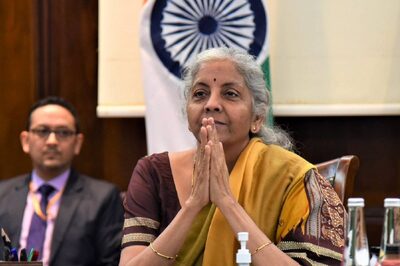
views
The pandemic not only challenged our health infrastructure but the constant isolation, deaths of loved ones, and the fear of catching the infection pushed everyone to the brink of psychological trauma, regardless of age. Experts warned that a historic wave of mental-health problems was approaching — depression, substance abuse, post-traumatic stress disorder, and suicide. However, the unprecedented health crisis also acted as an eye-opener, making people focus on both physical and mental health. Thanks to technology, getting professonal help has now been made easier.
During the mental health week, to talk about the broad spectrum of issues surrounding mental health and awareness, News 18 reached out to the CEO and Co-founder of Mumbai-based mental health organisation- Trijog- Arushi Sethi. Twenty-six-year-old Sethi is a media graduate and began her entrepreneurial journey in 2015. In her interview, she talks about her own journey, how we can eradicate the stigma around mental health and how she dealth with PTSD.
Edited excerpts from the interview:
How and when did you decide to use your entrepreneurial skills and begin your journey with Trijog? Could you elaborate on your six-year-long journey?
There comes a moment in everybody’s life where they sit up and reflect into understanding, ‘how could the skills that they hone orchestrate change on a larger scale?’ It was after observing my mother closely transform lives while growing up, personally going through a life and death experience, successfully overcoming PTSD, and working through my anxiety, I realised that it was time, in 2015, to take the entrepreneurial beacon forward and make sure that this knowledge and service reach millions of others as well. It was then that we decided, we must start an organisation that can increase the accessibility and service of mental healthcare in our country as well as globally.
One thing that the past 6 years have truly taught me- ‘Having faith, removes fear; Having patience, helps you persevere; and showing gratitude, helps one attract greatness’.
In every entrepreneur’s journey, It is very important to understand that one will face numerous challenges, but your intention and vision need to be clear. Clarity is extremely important- to turn intention into action. Reminding myself constantly of these few learnings has definitely helped me hold space in this journey.
– Walking the talk and delignating your limitless vision.
– Extreme Resilience in bouncing back from any setback.
– People Management; Building authenticity and an attitude of ownership, complete responsibility, and creating an
environment of trust and understanding.
– Being committed to what you’ve set out to do, no matter whatever hurdle or obstacle comes your way.
If the last six years have taught me anything, it is that there is always a solution if there’s a problem, but only if you’re willing to find it. Hard work is the answer. There is so much in growing ourselves, every day, becoming a better version of who we are in order to extend better and do better.
As a millennial mental health advocate, how do you think the stigma around mental illness can be dealt with?
The moment we need to deal with any stigma, the truth is, we need to eradicate it with education, communication and conversation around it. I believe that acknowledgement, acceptance, and understanding the concept is equally important. Only and if we are empowered we are in a position to help empower others. So, as a generation, we need to take responsibility for ourselves that each of us becomes a Mental Health Champion, and once you know how to feed your own mind, you will definitely know how to care for the rest.
The real change will be brought when emotional health is taught in schools, on an educational level, when the government begins investing in mental health on a priority basis, the companies or workplaces begin investing in the emotional health of their employees.
How was your experience of dealing with PTSD post-Nepal earthquake, would you have any suggestions for someone who is going through a similar experience?
Initially, the experience was extremely daunting, to feel an upsurge and such constant and strong emotions. The best tool that equipped me was– taking therapy to become aware of how I am feeling as well as to work towards transforming those feelings into actions. For anybody who’s experiencing PTSD, my advice would be to get professional help because there are so many things about our own lives and so many emotions breeding inside that we have absolutely no idea about. So it’s best to involve the experts in the process of channelising our emotions from unhelpful to helpful ones, who know the science behind it and could help us give the right direction in life.
As a co-founder of a leading psychotherapy venture, what would be your advice to the country’s youth who are dealing with stress, anxiety, and substance abuse?
Dear youth,
It is amazing for me to see that we have begun to recognise and accept our feelings, anxieties, our stress, and substance use what we have subjugated ourselves to. Identification is the first step to bringing about an optimal level of functioning by learning how to effectively deal with stress and the anxiety we go through.
Stress is caused by extrinsic and intrinsic factors in our life, extrinsic factors are those that are outside of us and present in our immediate environment, (the pandemic) (the wifi) (weather conditions) how we think of them generally causes one stress. This stress manifests itself into our body and takes multiple forms, which we call anxiety, fear, restlessness and numerous other names. There are also certain intrinsic factors that usually add to our stress. External factors are generally out of our circle of control, but the internal factors, which are mainly our thoughts, feelings, and actions, are in our circle of control. How we think about a situation leads to the way we feel about it and our reaction v/s a reason.
Knowing this fact that our thoughts lead to our feelings, and feelings to actions is the key to help us move into a helpful thought pattern so we lower our stress and anxiety levels. Learning, and understanding what kind of thoughts work for you, is something that I would encourage us all to do.
Therapy is, undoubtedly, one of the best ways to understand, acknowledge and align our thoughts, feelings, and actions, for which the principal aim is to identify and implement what is best for our beautiful bodies and minds!
With the pandemic worsening mental health situation, how do you think Indian mental health infrastructure can be improved, as the treatment opportunities are limited to Tier 1, 2, and 3 cities?
When tier 1 cities, corporations, and insurance companies start opening up themselves, this is a mandatory thing to take up services for ensuring one’s healthy emotional quotient so that their employees can be benefited through their budgets. But there is no doubt that when it comes to tier 2 and tier 3 populations, mental health services remain inaccessible. This access will be open to them only when our government intervenes and takes up serious initiatives towards the cause.
Today, we don’t even have provisions for Mental Health care in the bills and budgets that are being sanctioned in our country. So we are working towards making Mental Health Care services more affordable and accessible for the tier 1 segment. Once that reception is achieved, we can reach out to the next tier segment in another 5 years as hoped.
Trijog, as an organisation, looks towards reaching out to the grassroots level to make sure that therapy at subsidised and affordable rates can be provided to all.
Read all the Latest News , Breaking News and IPL 2022 Live Updates here.



















Comments
0 comment